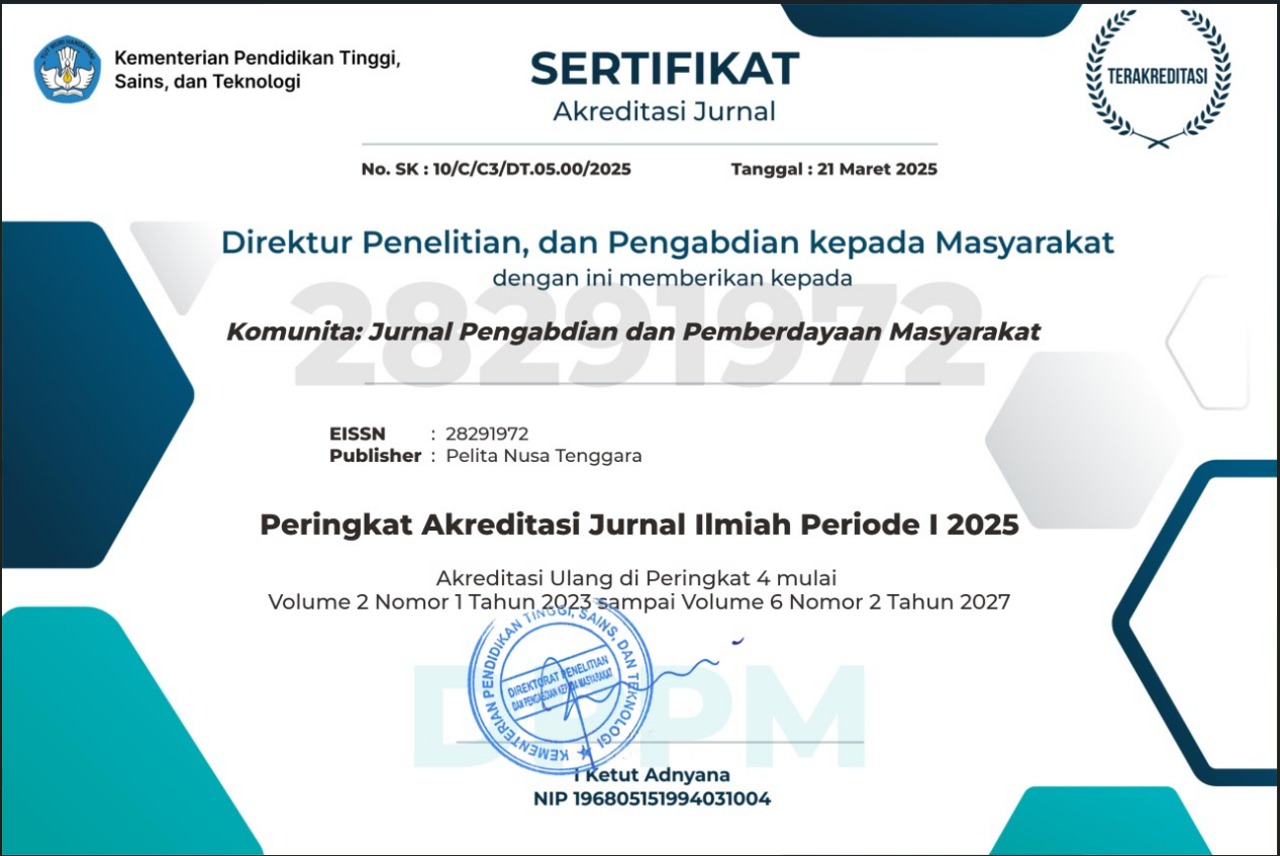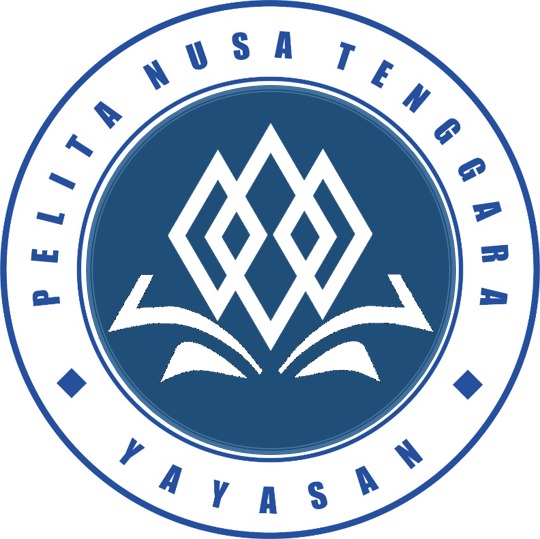Sastra, Kosakata, dan Gamifikasi: Sebuah Eksplorasi Literasi Bahasa Inggris untuk Anak
Abstract
Tujuan dari artikel pengabdian ini adalah untuk mengeksplorasi pemanfaatan sastra, khususnya dongeng dan permainan Tebak Kata sebagai alternatif pembelajaran kosakata yang efektif dan menyenangkan bagi anak-anak usia dini. Metode yang digunakan dalam pengabdian ini adalah metode terpadu (mixed method) dengan pendekatan Explanatory Sequential Design (pengumpulan data kuantitatif melalui survei kepada 20 mahasiswa pengajar dilanjutkan dengan pengumpulan data kualitatif melalui wawancara dengan 3 narasumber). Survei menggunakan skala Likert dan wawancara semi-struktural untuk menggali persepsi dari mahasiswa pengajar. Data dari keduanya dianalisis dengan analisis data terpadu (mixed-method analysis) dengan model analisis interaktif. Kegiatan pengabdian ini dilaksanakan di Masjid Al-Ikhlas, Prima Garden Estate, Kecamatan Sukodono, Kabupaten Sidoarjo, Jawa Timur, selama tiga minggu pada bulan April 2025. Hasil dari kegiatan pengabdian ini menunjukkan bahwa mayoritas pengajar (85%-90%) merasa bahwa penggunaan dongeng dan permainan Tebak Kata sangat efektif dalam membantu anak-anak mengingat dan memahami kosakata baru, serta meningkatkan minat mereka dalam belajar. Meskipun terdapat tantangan dalam menjaga fokus anak-anak dan mengajarkan kosakata yang lebih kompleks, metode ini terbukti lebih disukai oleh anak-anak dibandingkan dengan metode pengajaran konvensional.
References
Al-Dosakee, K., & Ozdamli, F. (2021). Gamification in Teaching and Learning Languages: A Systematic Literature Review. Revista Romaneasca Pentru Educatie Multidimensionala, 13(2). https://doi.org/10.18662/rrem/13.2/436
Anggraini, A. (2021). Teaching English Vocabulary for Young Learners Using Electronic Word Gueesing Game. VELES Voices of English Language Education Society, 5(2). https://doi.org/10.29408/veles.v5i2.3873
Bakti, K. N. N. (2018). Vocabulary Learning Strategies Used by Junior High School Students. Indonesian Journal of English Language Studies (IJELS), 3(2). https://doi.org/10.24071/ijels.v3i2.1064
Bhatti, M. S., Iqbal, A., Rafique, Z., Noreen, S., & Tabassum, F. (2022). Short stories as an innovative EFL teaching technique to improve Pakistani elementary students’ English vocabulary. Journal on English as a Foreign Language, 12(2). https://doi.org/10.23971/jefl.v12i2.4060
Boy Jon, R., Embong, R., Purnama, B., & Safar Wadi, A. (2021). The Challenges of English Language Teaching in Indonesia. International Journal of English and Applied Linguistics (IJEAL), 1(3). https://doi.org/10.47709/ijeal.v1i3.1157
de Rijke, V. (2021). Reading children’s literature. Education 3-13, 49(1). https://doi.org/10.1080/03004279.2020.1824703
Dehghanzadeh, H., Fardanesh, H., Hatami, J., Talaee, E., & Noroozi, O. (2021). Using gamification to support learning English as a second language: a systematic review. In Computer Assisted Language Learning (Vol. 34, Issue 7). https://doi.org/10.1080/09588221.2019.1648298
Figueroa Flores, J. F. (2015). Using Gamification to enhance second language learning. In Digital Education Review (Issue 27).
Gultom, E. (2015). English Language Teaching Problems in Indonesia. 7th International Seminar on Regional Education, 3.
Hansen, J. E., & Broekhuizen, M. L. (2021). Quality of the Language-Learning Environment and Vocabulary Development in Early Childhood. Scandinavian Journal of Educational Research, 65(2). https://doi.org/10.1080/00313831.2019.1705894
Hoffman, J. L., Teale, W. H., & Paciga, K. A. (2014). Assessing vocabulary learning in early childhood. Journal of Early Childhood Literacy, 14(4). https://doi.org/10.1177/1468798413501184
Kwan, Y. H. (2023). Guess the Right Word: A Review of the Language Game Wordle. In RELC Journal. https://doi.org/10.1177/00336882231192121
La Cruz, K. M. L. De, Noa-Copaja, S. J., Turpo-Gebera, O., Montesinos-Valencia, C. C., Bazán-Velasquez, S. M., & Pérez-Postigo, G. S. (2023). USE OF GAMIFICATION IN ENGLISH LEARNING IN HIGHER EDUCATION: A SYSTEMATIC REVIEW. Journal of Technology and Science Education, 13(2). https://doi.org/10.3926/jotse.1740
Laila, F. N., Adityarini, H., & Maryadi, M. (2023). Challenges and Strategies in Teaching English Speaking Skills to Young Learners: Perspectives of Teachers in Indonesia. VELES (Voices of English Language Education Society), 7(3). https://doi.org/10.29408/veles.v7i3.24030
Latkovska, E., & Cine, A. (2022). Gamification Elements in English Lessons to Encourage Young Learners’ Communication in a Foreign Language. https://doi.org/10.22364/htqe.2022.46
Lee, J. Y., & Baek, M. (2023). Effects of Gamification on Students’ English Language Proficiency: A Meta-Analysis on Research in South Korea. In Sustainability (Switzerland) (Vol. 15, Issue 14). https://doi.org/10.3390/su151411325
Luarn, P., Chen, C. C., & Chiu, Y. P. (2023). Enhancing intrinsic learning motivation through gamification: a self-determination theory perspective. International Journal of Information and Learning Technology, 40(5). https://doi.org/10.1108/IJILT-07-2022-0145
Malik, H., Humaira, M. A., Komari, A. N., Fathurrochman, I., & Jayanto, I. (2021). Identification of barriers and challenges to teaching English at an early age in Indonesia: an international publication analysis study. Linguistics and Culture Review, 5(1). https://doi.org/10.21744/lingcure.v5n1.1485
Mallan, K. (2017). Children’s Literature in Education. In Oxford Research Encyclopedia of Education. https://doi.org/10.1093/acrefore/9780190264093.013.157
Marcellino, M. (2015). ENGLISH LANGUAGE TEACHING IN INDONESIA: A CONTINUOUS CHALLENGE IN EDUCATION AND CULTURAL DIVERSITY. TEFLIN Journal - A Publication on the Teaching and Learning of English, 19(1). https://doi.org/10.15639/teflinjournal.v19i1/57-69
Mubaroq, S., & Qamariah, Z. (2024). Curriculum Approaches in English Language Teaching in Indonesia. Jurnal Ilmu Pendidikan Nasional (JIPNAS), 2(1). https://doi.org/10.59435/jipnas.v2i1.105
Parvareshbar, F., & Ghoorchaei, B. (2016). The Effect of Using Short Stories on Vocabulary Learning of Iranian EFL Learners. Theory and Practice in Language Studies, 6(7). https://doi.org/10.17507/tpls.0607.20
Rahn, N. L., Storie, S. O., & Coogle, C. G. (2023). Teaching Vocabulary in Early Childhood Classroom Routines. Early Childhood Education Journal, 51(7). https://doi.org/10.1007/s10643-022-01361-y
Rifa’i, A. H., Nurdianingsih, F., & Zainudin, M. (2022). Improving Students’ Vocabulary using Guessing Word Game At Seventh Graders of MTs. Darul Falah Cepu. Prosiding Seminar Nasional Hybrid IKIP PGRI BOJONEGORO.
Safura, S., Farsia, L., Nisa, R., Helmanda, C. M., Sarair, S., Trisnawati, I. K., & Netta, A. (2023). Literasi Bahasa Inggris Menggunakan Flash Card Untuk Anak-Anak Gampong Lam Raya, Kecamatan Montasik, Kabupaten Aceh Besar, Aceh. Jurnal Pengabdian Pada Masyarakat, 8(4). https://doi.org/10.30653/jppm.v8i4.557
Sailer, M., & Homner, L. (2020). The Gamification of Learning: a Meta-analysis. Educational Psychology Review, 32(1). https://doi.org/10.1007/s10648-019-09498-w
Sari, A. P. (2020). The Advantages and Disadvantages of English Learning For Early Childhood Education in Indonesia. Global Expert: Jurnal Bahasa Dan Sastra, 8(1). https://doi.org/10.36982/jge.v8i1.955
Schwantes, F. M., Boesl, S. L., & Ritz, E. G. (1980). Children’s Use of Context in Word Recognition: A Psycholinguistic Guessing Game. Child Development, 51(3). https://doi.org/10.2307/1129458
Sholichah, I. R., & Purbani, W. (2018). Fostering Language Skills Development through Fairy Tales: A Literature Study. https://doi.org/10.2991/iccsr-18.2018.73
Sowell, J. (2018). Talking about Words: A Vocabulary Description Game. English Teaching Forum, 56(4).
Teaching and Learning Vocabulary through Short Stories. (2022). Canadian Journal of Language and Literature Studies, 2(2). https://doi.org/10.53103/cjlls.v2i2.35
Thi, P., Van, T., Thi, L., Tran, B., & Khang, N. D. (2022). The impacts of using short stories for vocabulary learning. In International Journal of Early Childhood Special Education (INT-JECSE (Vol. 14).
Treewong, P. (2023). Fairy Tales and Promotion of Early Childhood Development. Rajabhat Chiang Mai Al-Dosakee, K., & Ozdamli, F. (2021). Gamification in Teaching and Learning Languages: A Systematic Literature Review. Revista Romaneasca Pentru Educatie Multidimensionala, 13(2). https://doi.org/10.18662/rrem/13.2/436
Anggraini, A. (2021). Teaching English Vocabulary for Young Learners Using Electronic Word Gueesing Game. VELES Voices of English Language Education Society, 5(2). https://doi.org/10.29408/veles.v5i2.3873
Bakti, K. N. N. (2018). Vocabulary Learning Strategies Used by Junior High School Students. Indonesian Journal of English Language Studies (IJELS), 3(2). https://doi.org/10.24071/ijels.v3i2.1064
Bhatti, M. S., Iqbal, A., Rafique, Z., Noreen, S., & Tabassum, F. (2022). Short stories as an innovative EFL teaching technique to improve Pakistani elementary students’ English vocabulary. Journal on English as a Foreign Language, 12(2). https://doi.org/10.23971/jefl.v12i2.4060
Boy Jon, R., Embong, R., Purnama, B., & Safar Wadi, A. (2021). The Challenges of English Language Teaching in Indonesia. International Journal of English and Applied Linguistics (IJEAL), 1(3). https://doi.org/10.47709/ijeal.v1i3.1157
de Rijke, V. (2021). Reading children’s literature. Education 3-13, 49(1). https://doi.org/10.1080/03004279.2020.1824703
Dehghanzadeh, H., Fardanesh, H., Hatami, J., Talaee, E., & Noroozi, O. (2021). Using gamification to support learning English as a second language: a systematic review. In Computer Assisted Language Learning (Vol. 34, Issue 7). https://doi.org/10.1080/09588221.2019.1648298
Figueroa Flores, J. F. (2015). Using Gamification to enhance second language learning. In Digital Education Review (Issue 27).
Gultom, E. (2015). English Language Teaching Problems in Indonesia. 7th International Seminar on Regional Education, 3.
Hansen, J. E., & Broekhuizen, M. L. (2021). Quality of the Language-Learning Environment and Vocabulary Development in Early Childhood. Scandinavian Journal of Educational Research, 65(2). https://doi.org/10.1080/00313831.2019.1705894
Hoffman, J. L., Teale, W. H., & Paciga, K. A. (2014). Assessing vocabulary learning in early childhood. Journal of Early Childhood Literacy, 14(4). https://doi.org/10.1177/1468798413501184
Kwan, Y. H. (2023). Guess the Right Word: A Review of the Language Game Wordle. In RELC Journal. https://doi.org/10.1177/00336882231192121
La Cruz, K. M. L. De, Noa-Copaja, S. J., Turpo-Gebera, O., Montesinos-Valencia, C. C., Bazán-Velasquez, S. M., & Pérez-Postigo, G. S. (2023). USE OF GAMIFICATION IN ENGLISH LEARNING IN HIGHER EDUCATION: A SYSTEMATIC REVIEW. Journal of Technology and Science Education, 13(2). https://doi.org/10.3926/jotse.1740
Laila, F. N., Adityarini, H., & Maryadi, M. (2023). Challenges and Strategies in Teaching English Speaking Skills to Young Learners: Perspectives of Teachers in Indonesia. VELES (Voices of English Language Education Society), 7(3). https://doi.org/10.29408/veles.v7i3.24030
Latkovska, E., & Cine, A. (2022). Gamification Elements in English Lessons to Encourage Young Learners’ Communication in a Foreign Language. https://doi.org/10.22364/htqe.2022.46
Lee, J. Y., & Baek, M. (2023). Effects of Gamification on Students’ English Language Proficiency: A Meta-Analysis on Research in South Korea. In Sustainability (Switzerland) (Vol. 15, Issue 14). https://doi.org/10.3390/su151411325
Luarn, P., Chen, C. C., & Chiu, Y. P. (2023). Enhancing intrinsic learning motivation through gamification: a self-determination theory perspective. International Journal of Information and Learning Technology, 40(5). https://doi.org/10.1108/IJILT-07-2022-0145
Malik, H., Humaira, M. A., Komari, A. N., Fathurrochman, I., & Jayanto, I. (2021). Identification of barriers and challenges to teaching English at an early age in Indonesia: an international publication analysis study. Linguistics and Culture Review, 5(1). https://doi.org/10.21744/lingcure.v5n1.1485
Mallan, K. (2017). Children’s Literature in Education. In Oxford Research Encyclopedia of Education. https://doi.org/10.1093/acrefore/9780190264093.013.157
Marcellino, M. (2015). ENGLISH LANGUAGE TEACHING IN INDONESIA: A CONTINUOUS CHALLENGE IN EDUCATION AND CULTURAL DIVERSITY. TEFLIN Journal - A Publication on the Teaching and Learning of English, 19(1). https://doi.org/10.15639/teflinjournal.v19i1/57-69
Mubaroq, S., & Qamariah, Z. (2024). Curriculum Approaches in English Language Teaching in Indonesia. Jurnal Ilmu Pendidikan Nasional (JIPNAS), 2(1). https://doi.org/10.59435/jipnas.v2i1.105
Parvareshbar, F., & Ghoorchaei, B. (2016). The Effect of Using Short Stories on Vocabulary Learning of Iranian EFL Learners. Theory and Practice in Language Studies, 6(7). https://doi.org/10.17507/tpls.0607.20
Rahn, N. L., Storie, S. O., & Coogle, C. G. (2023). Teaching Vocabulary in Early Childhood Classroom Routines. Early Childhood Education Journal, 51(7). https://doi.org/10.1007/s10643-022-01361-y
Rifa’i, A. H., Nurdianingsih, F., & Zainudin, M. (2022). Improving Students’ Vocabulary using Guessing Word Game At Seventh Graders of MTs. Darul Falah Cepu. Prosiding Seminar Nasional Hybrid IKIP PGRI BOJONEGORO.
Safura, S., Farsia, L., Nisa, R., Helmanda, C. M., Sarair, S., Trisnawati, I. K., & Netta, A. (2023). Literasi Bahasa Inggris Menggunakan Flash Card Untuk Anak-Anak Gampong Lam Raya, Kecamatan Montasik, Kabupaten Aceh Besar, Aceh. Jurnal Pengabdian Pada Masyarakat, 8(4). https://doi.org/10.30653/jppm.v8i4.557
Sailer, M., & Homner, L. (2020). The Gamification of Learning: a Meta-analysis. Educational Psychology Review, 32(1). https://doi.org/10.1007/s10648-019-09498-w
Sari, A. P. (2020). The Advantages and Disadvantages of English Learning For Early Childhood Education in Indonesia. Global Expert: Jurnal Bahasa Dan Sastra, 8(1). https://doi.org/10.36982/jge.v8i1.955
Schwantes, F. M., Boesl, S. L., & Ritz, E. G. (1980). Children’s Use of Context in Word Recognition: A Psycholinguistic Guessing Game. Child Development, 51(3). https://doi.org/10.2307/1129458
Sholichah, I. R., & Purbani, W. (2018). Fostering Language Skills Development through Fairy Tales: A Literature Study. https://doi.org/10.2991/iccsr-18.2018.73
Sowell, J. (2018). Talking about Words: A Vocabulary Description Game. English Teaching Forum, 56(4).
Teaching and Learning Vocabulary through Short Stories. (2022). Canadian Journal of Language and Literature Studies, 2(2). https://doi.org/10.53103/cjlls.v2i2.35
Thi, P., Van, T., Thi, L., Tran, B., & Khang, N. D. (2022). The impacts of using short stories for vocabulary learning. In International Journal of Early Childhood Special Education (INT-JECSE (Vol. 14).
Treewong, P. (2023). Fairy Tales and Promotion of Early Childhood Development. Rajabhat Chiang Mai Research Journal, 24(3). https://doi.org/10.57260/rcmrj.2023.264131
Wen, X. (2023). The Effect of Gamification Learning on Primary School Students’ Second Language Learning. Journal of Education, Humanities and Social Sciences, 22. https://doi.org/10.54097/ehss.v22i.12510
Yasin, K. (2015). Survey on effects of fairy tales on Turkish language training from secondary school students perspective. Educational Research and Reviews, 10(4). https://doi.org/10.5897/err2015.2073








